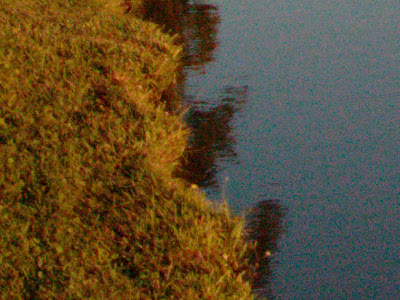Shortly after pressing that shutter button, the internal computer chip in your digital camera begins to process the data collected by the sensor and then saves that data as a “picture” in the form of a data file on the memory card. Most likely, that data file is either a JPEG or a raw file format. JPEG is an acronym for Joint Photograpic Experts Group . JPEG files have “jpg” as the filename extension; for example, myfile.jpg is the filename of a JPEG image. Whereas JPEG files follow international standards, a raw file is proprietary to the particular camera manufacturer according to their needs. Therefore, many devices have software to read and process JPEG images but few can deal with raw images because all the raw image files are different.
In the case of the Canon G9, the raw image files have the filename extension cr2; for example, myfile.cr2 is (probably) a Canon raw image file. However, just because the filename has the .cr2 extension does not necessarily mean that it came from a Canon G9 camera because all the current Canon cameras having raw capability save their raw images with a cr2 filename extension. My G3 used a crw filename extension.
So, what’s the difference between JPEG and raw and why worry about it? Well, there is – or can be – a lot of difference but you don’t have to
.jpg) worry about it unless you want to. On the other hand, if you are concerned about maximizing image quality, developing a personal or customized look and generally pushing the limits of photography, then you should learn to process raw image files. The raw image file is sometimes described as the digital version of a (film) negative whereas the JPEG image coming straight out of the camera is more like a machine processed print from that negative. Although debatable and not strictly true, this description and comparison is easily understood. This picture is a 100% crop (click for larger view) from the raw file of a previously used scene; it has had no (as far as I can tell) post processing. Kind of ugly, fuzzy and noisy, isn't it?
worry about it unless you want to. On the other hand, if you are concerned about maximizing image quality, developing a personal or customized look and generally pushing the limits of photography, then you should learn to process raw image files. The raw image file is sometimes described as the digital version of a (film) negative whereas the JPEG image coming straight out of the camera is more like a machine processed print from that negative. Although debatable and not strictly true, this description and comparison is easily understood. This picture is a 100% crop (click for larger view) from the raw file of a previously used scene; it has had no (as far as I can tell) post processing. Kind of ugly, fuzzy and noisy, isn't it?It is very important to realize that your camera makes its JPEG from the raw data in about a second or so. I call this image the "in-camera" JPEG. You can make your own JPEG from the raw file by using any editor that can read the proprietary raw file. This is what I do; of course, it takes me quite a bit longer than one second. So, most of the time, my final product is a JPEG file and, for my best efforts, a print made from that JPEG file.
One advantage of learning about raw image processing is that you are then entitled to participate in the endless debates about whether raw or JPEG is “best” or, for that matter, even worthwhile. In the great raw vs JPEG debate, when someone states that they've thoroughly investigated, studied and tested to come to the conclusion that JPEG is "good enough" or that their own JPEGs are "as good as" their own raw post processed images then I believe them. When someone states that they get better results using raw and post processing (my own experience) then I believe them as well.
(This is another post that will be continued and also used as a reference and link).
.
No comments:
Post a Comment